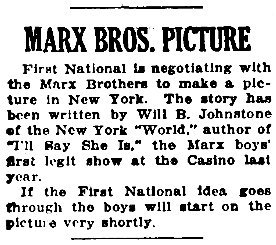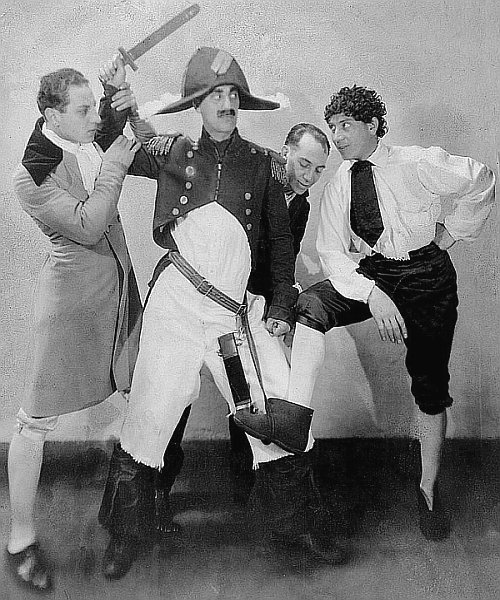
[Main Page] | [History] | [Vaudeville] | [Misc.] | [Films & Film Projects]
 | Mikael Uhlin's Marxology @ marx-brothers.org
[Main Page] | [History] | [Vaudeville] | [Misc.] | [Films & Film Projects] |

|
"We wanted to get into the
movies", Groucho said when interviewed by Richard
Anobile about Humor Risk
in The
Marx Brothers Scrapbook, and it's pretty obvious that the
Marxes made several attempts at it in the 1920s. On 11 April 1921, Film
Daily
promised two follow-ups to Humor
Risk to be titled Hick Hick
Hooray and Hot Dog, but nothing ever
happened with these three Caravel Comedies "without custard".
Most of the following years were devoted to I'll Say She Is, culminating in the Broadway break-through by the Marx Brothers, but in 1925 two of brothers participated in one film each, namely Harpo (Too Many Kisses) and Zeppo (A Kiss In The Dark). After the success on Broadway, the Marx Brothers became well-known and people started to copy their act. Margaret Farrell, a relative of Will B. Johnstone, notes in her 2013 paper for the City University of New York, I'll Say She Is! (1924): The 'laugh-a-minute' revue that made the Marx Brothers, that the Minor's Burlesque Theatre on the Bowery very early tried to copy the Napoleon scene, and in The Annotated Marx Brothers (2015), Matthew Coniam cites a review from Variety, 3 March 1926 of the film Behind the Front, which has a scene copied from I'll Say She Is where a pick-pocket drops a lot of knives and forks from his sleeves. In July 1999, ScotJohn96 reported on alt.comedy.marx-bros about another film project connected to I'll Say She Is and mentioned in Variety on 24 March 1926:  Based on the diaries of Will B. Johnstone, Farrell identifies this movie scenario as The Gate Crashers, a title which suggests that the brothers would be featured as unwanted guests. That's a common and rather ideal situation for the Marx Brothers, like the stowaways they would play in 1931 in Monkey Business (co-written by Johnstone). The Marxes liked the script but in the end the movie studios did not. On 8 December 1925, the Marxes second Broadway show The Cocoanuts opened at the Lyric Theatre. When it closed after 276 performances on 7 August 1926, United Artists wanted to film it (which would have meant a silent movie). This project apparently went as far as screen tests, as reported by Variety on 27 April 1927. |
 Another interesting project was mentioned in New York Evening Post on 28 February 1928 (and quoted by Matthew Coniam in his The Annotated Marx Brothers). It was another reminder of the impact of the Napoleon scene in I'll Say She Is when a "moving picture company" offered the Marxes a "staggering sum" to appear in a screen burlesque on the life of Napoleon Bonaparte. This time, though, Harpo would have played Napoleon while Groucho was casted as the Duke of Wellington, Chico as Prussian General von Blücher and Zeppo as King Frederick William III of Prussia. The Marxes refused the offer ("at least for the time being"), but of course the film was never made. According to Variety, MGM was also courting the Marx Brothers in 1928 for "a series" of comedies, but they signed for Paramount and before the end of the decade, on 3 May 1929, their first film had its premiere. |